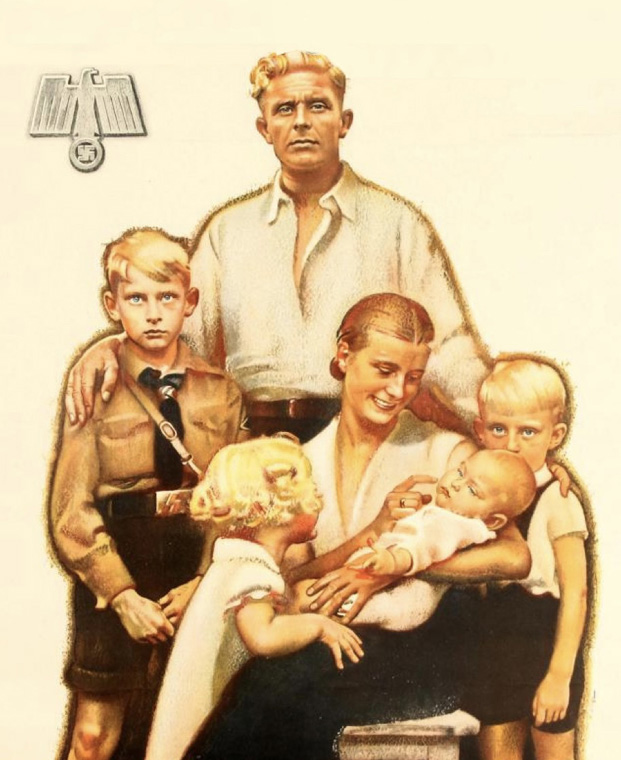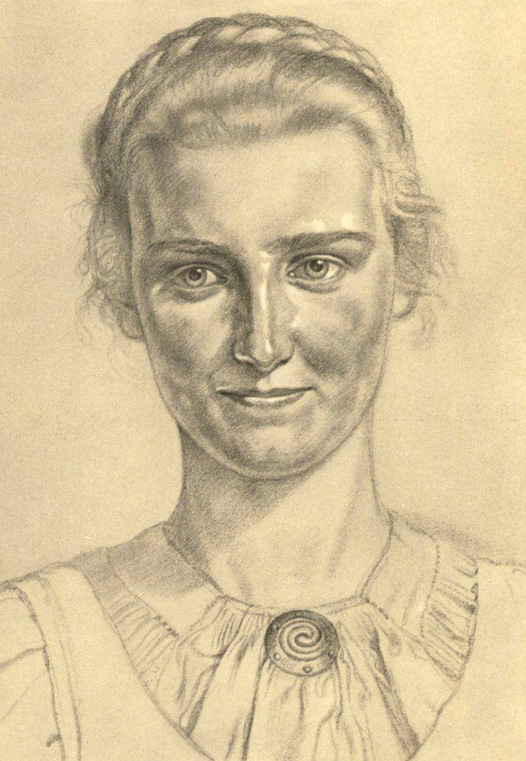Interview with Irmgard Decker, who lived in Essen during the war and lost a son who served in a Luftwaffe Flak Regiment, Stuttgart, 1988.


Interview with Irmgard Decker, who lived in Essen during the war and lost a son who served in a Luftwaffe Flak Regiment, Stuttgart, 1988.


Irmgard: Yes, you may but first before I answer that, you must know me first and my life story. I was born in 1905 not far from here. I was alive during the time of the Kaiser and remember life in the first war. It was hard on Germans as I remember food being very scarce here. There were many nights I remember going to bed hungry. That was so long ago. The war was over in 1918, and I was reduced to just skin and bones, often times relying on my better off friends' families to feed me. My father was a hard worker but did not make nearly enough to care for 3 children. My mother had to resort to working odd jobs just to provide us food.
When the war was over the situation was unstable as French soldiers occupied some areas of Germany here. I remember there was sporadic fighting that broke out between the reds and returning soldiers. Germany went into a kind of civil war, where we had to stay off the streets at night. There was crime and fighting happening all at once. Our situation never improved much, as the English enforced a blockade of Germany until I believe 1920 and then food began to become more plentiful and cheaper. I remember my father would always complain about the prices, and he sided with the reds as he thought they would bring stability and stop companies from preying on the people.
You could say I grew up in a red household to a degree as my mother thought the old ways just did not work anymore. I would hear her, and the other mothers talk loudly each morning about how the red front would bring better days to Germany. They felt that the rich made too much money off the people and inflated prices needlessly as they knew people would pay. I knew that fighting was happening around the borders of the old Reich as well, and there was internal fighting now between the Nazis and the reds, with my family believing the red front was the correct side. I was starting to develop a political eye at this time, I was a teenager and paying attention to the world around me.
This whole area was working class people, and the reds always spoke about how the common man was being taken advantage of by the wealthy, and how it was causing all our problems. Many believed this and fought to vote in the red parties here. It was in 1925 I started to see the Nazis come up. They would hold rallies wearing their brown uniforms and waving those swastika flags around.
I remember feeling like a good supporter by tearing down their posters and throwing them in the trash. They spoke also of the working class, but I never bothered to read anything they wrote. In my eyes they were against what I wanted for my country. Can you imagine that, seeing people who wanted to help you as the enemy? Well, I did. Let me continue. It was not until 1927 that I started to question myself. You see I met a man in 1923 who was a friend of my best friend. We shared that spark and by January 1924 we were married. He worked in a factory and had the means to support me. We had our first child in February 1925. I remember thinking what future were we giving him?
My man was a supporter of Hitler, so you might find this strange on how I fell for him. I started to notice something odd. The supporters of the red front were uneducated, sloppy, drunkards, had many family problems, and hated their lives. I started to see this in my father. My father made me see that if he was the result of supporting the reds, then I did not want it. He drank too much and often neglected my mother to be out with his friends drinking and complaining about their situation. He seemed to resent being married and became abusive, using the political situation as an excuse. I was starting to resent this. In contrast I looked at my new man who was clean, upbeat, intelligent, athletic, and caring.
I was introduced to some of those who supported Hitler, and I saw the same thing, very intelligent, well groomed, polite, and caring. It was here I started to question just who the red front was and who the Nazis were. I started reading more of their pamphlets and was sick that I used to tear down these things. They were Germans, who cared for their nation and wanted it to be free from the perils that plagued us. The red front preached revolution so that we would be aligned and protected by Moscow. In contrast the NSDAP wanted us to depend on each other and build each other up as equals, to make us self-sufficient. The more I read the more I had a change of heart. I started to become distant from my father as he began to fade from this life. He drank too much, abused my mother, and seemed very disconnected as if we never existed. He died in 1929 from liver failure. It was sad. I had my new life however and we had a nice flat we called home.
When the depression hit it was bad for everyone with many losing their jobs and life savings. There were suicides often and sadly I must tell you my mother was one of those who she just could not bear life without father and chose to not go on any longer. There were many Germans who took this way out as they had no hope. It was ironic to me that I went with my man to hear Hitler speak in 1931 and it was the very topic of his speech that pulled me in. Hitler spoke of how shameful it is that a society does not care for its own people and just lets them expire like unwanted baggage. His message was one of love, self-worth, honor, and turning Germany into a state that cares for its own people, not worrying about the rest of the world.
I am sorry to be so long-winded, but I thought you might like to understand a little about myself and how I came to see Hitler as a great leader. You see I voted for him in 1932 and 1933, and I even became a party member like my man, but don't tell anyone. So now I will tell you what it was like. Hitler was elected in 1933 and almost overnight we started to see the stability he spoke of bringing. The week he was elected, the reds here rioted and smashed windows and threatened a revolt. He was quick to quell this and many of the Red Front were locked up and for once the streets were safe at night. I would see the SA men out patrolling with police. You felt very safe as the political violence was over. The NSDAP also started welfare centers for anyone needing food and care. I was compelled to volunteer here when I could. It was all about helping those in need. Mostly it was the wives of old Red Front men who really were bad at supporting their families.
Here is where I will tell you the party really seemed to shine and win over converts. There was no bravado or insults, I saw a healing hand reach out to former opponents and asked them to come over to help build a better Germany. I would see some of the former Red Front people and gladly helped them with their needs. Some I could tell would never give up their beliefs, but all we could do was be kind to them. Life just became better and better for most all Germans, some of course saw no change, but most did. We made more money and could afford better things. I remember on our anniversary one year; we paid a babysitter, and we took the train to Cologne and rode paddle boats on the river. My man then took me shopping for a nice dress and we went out to a fancy dinner. My first. In this time, I felt Germany was being remade into a society that was nice to live in, I remember being very happy and it was just a joy to be alive in this time. The cities were clean, safe, and everyone had smiles on their faces, and friendliness you now only see in the older ones who remember.
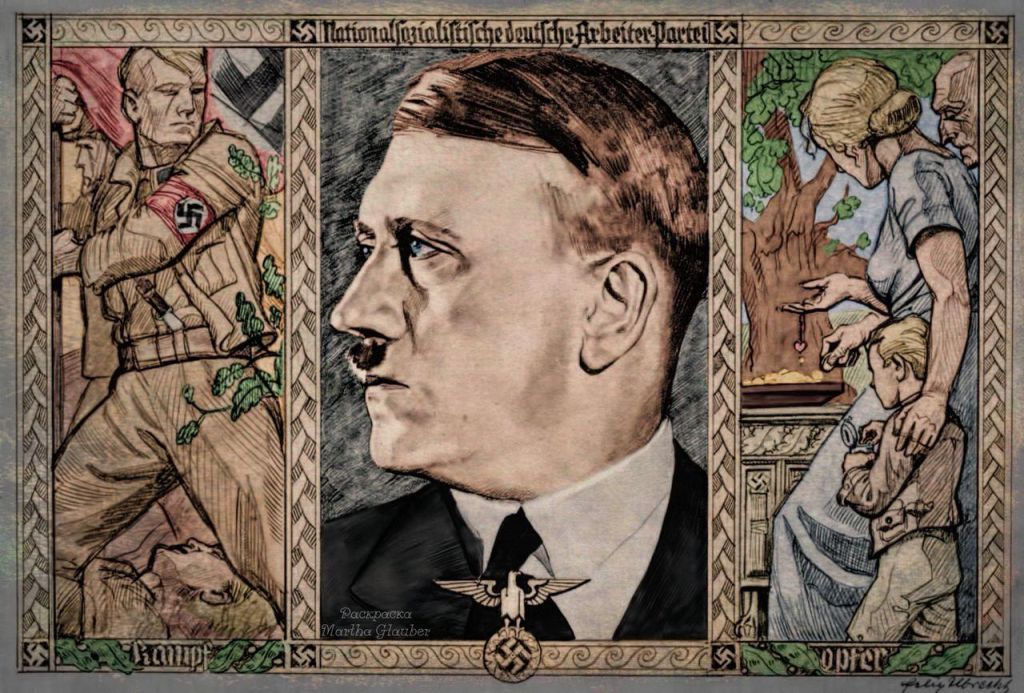
Do you remember seeing any dissent in Germany? I have read in some books that many Germans secretly opposed Hitler and tried to warn Germans of the impending war and disaster he was bringing.
Irmgard: Young man, you must remember something. There are a lot of people who today say things that are only true in their minds. The war was lost so people were forced and encouraged to say things very disparaging about Hitler and the period. I know that not everyone supported Hitler, there were still Red Front believers and those who were just non-political and only wanted to be left alone.
Of course, you hear some people say some things that caught your ear, like high taxes or a silly law. People are fickle and during the war rationing was not popular so many people would complain. There were also problems with hoarding and black market sales, which were illegal.
When these people write what they do I would question their motive. I am seeing more and more, these were opponents of Hitler already, so they are taking an opportunity to air their political views more than anything. It is indeed insightful that people who were living in a peaceful nation that was prosperous and not seeking war, could see war was on the horizon. Or are they just being liars?
It is almost like they want the reader to think they were clairvoyant or something magical. Hitler was elected on one main topic, to undo Versailles and its repercussions. We fully knew Hitler was going to reunite the Rhineland, Sudetenland, and the eastern lands. This was both reasonable and expected. Any nation in our shoes would have done this, and Britain has a few times.
You will always hear those disgruntled people, but in the case of Hitler the Allies paid and encouraged many to come out and tell stories about how Hitler and the Nazis were bad for them and Germany. I will not believe them as I was alive then as well and saw what life was like. Unless you openly broke the law or tried to influence others to rise against Hitler you were fine and lived a happy life.
Can I ask about your son, I understand he served in the armed forces and fell in battle? Did he describe the war much to you?
Irmgard: Yes, my son was named Hans and was born in 1925, in 1943 he begged to be allowed to serve in the war, as many of his friends were doing. He was in the Hitler Youth, and they had been doing small war work like helping farmers or building since 1939. He was excited to be able to go. He enlisted into a Luftwaffe flak unit that was deployed to the east front in mid-1943.
He would write to me often and tell me what he was seeing and what life was like. I did not like the idea of this, but his father was all about serving the nation. My man was thankfully able to stay home as he was important in the arms factory as a tool maker. I worked in the welfare office for orphans when I could.
There were many children who ended up losing their parents in the war with no relatives and the office would run orphanages for them. They would have lots of company and we tried to make their stay as happy as we could. Trying to take everyone's mind off the war was a big task. This also helped me worry less about my son, as I had many sons and daughters to take care of.
Hans fought in the east and was then moved to the south to fight for Hungary. Then moved up to the north from the last letter received from him. He was reported as killed in April of 1945 before Berlin. We were devastated but with the war coming to us it took our minds off grieving until after it was over.
We never had a chance to say goodbye that final time. He came home on a leave that Christmas and was excited to be posted back to his comrades in the east. He wore the Iron Cross I remember and was very proud of this. He even had a girlfriend come meet us at a home we were staying in that Christmas. We had to move due to the bombings.
I remember her name as Charlotte and she was a nurse from Iserlohn [a city in North Rhine-Westphalia, Germany], they had met at some dance being held during his training. She was a very pretty girl who sadly did not seem to survive the war either, so it is my hope they are in each other's arms since.
Please forgive me if I am too intrusive, but did Hans ever comment on the fighting and if he ever saw any war crimes? I ask because so many books tell stories of Germans soldiers being appalled at the crimes being committed by their forces.
Irmgard: Heavens you have been reading some stories. My man spoke more to Hans about this as I didn't to care to hear how dangerous the front was. I only remember him saying how vast Russia was and how there were many who stayed behind when the Soviets retreated as they hated Stalin.
He wrote once how cold the winter of 1943 was and how they stayed with a Russian family who cooked them fine meals to stay warm. The boys would cut them firewood and do chores, and the mother cooked them food and cleaned their uniforms. He said the same thing happened in Poland where the civilians would help them.
From stories you hear in the papers and TV today you would think they were running around burning houses and looting. I know this is not true and just propaganda meant to belittle us. Our sons fought for their nation and people in a time of war and fought with honor. No one will convince me otherwise. Those people are trying to purposefully push a political agenda, or they do not know they are being used.
Hans never brought up any concerns of the war in the east, except saying the Russian soldiers could be very fanatical and had done bad things in some areas of the front. He mostly talked positively as he did not want us to worry. He certainly never said anything bad about the SS, his best friend was in the Hitler Youth Division and fell in the Ardennes. I met with his mother to comfort her. You can see why war is not good and mothers pray their sons never have to go off to fight in one.
[Above: (left) This says: 'Die Hitlerjugend
grüßt die Front!'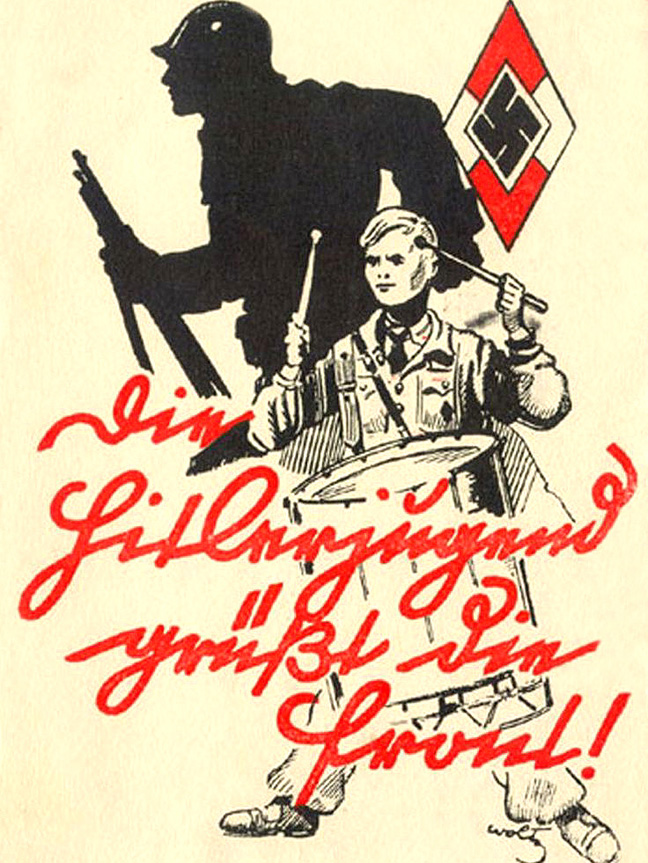
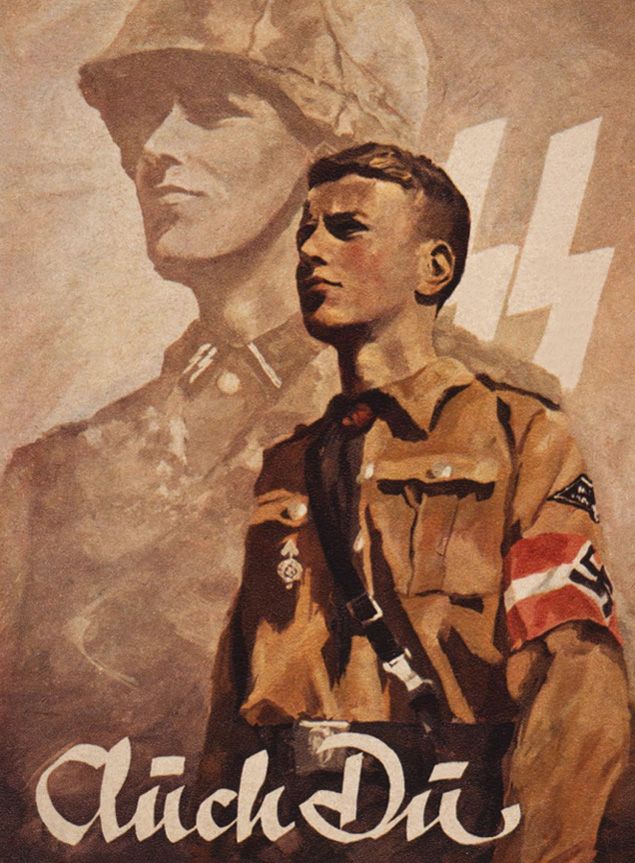
(A Hitler Youth Greetings From the Front!)
(right) Hitler Youth recruiting poster for the Waffen-SS.
'Auch Du'
(You too)]
Can I ask why you think so many bad stories are told about Hitler and the conduct of German soldiers? As you can tell these questions intrigue me and I like to get opinions about them.
Irmgard: From what I see and have read myself the stories that people tell seem to be always motivated by something. Either they have a grievance against Germany or Hitler, or they just want to have a spot in the limelight. Some stories I can see being true, like people arrested for hoarding, black market dealings, or other blatant crimes.
Others, where the people say they saw shootings, hangings, and war crimes, I am skeptical about these. They all seem to be based on hearsay stories that cannot be honestly verified. I mean by having impartial people look into them and come to a finding based on just the facts that can be proven.
I believe hearsay stories got us, they take one person's word and keep it as a fact, often repeating it so that it becomes ingrained as factual history. This is what I feel most war crimes or atrocity claims are based on. Why would they make it up? You might ask, there are many reasons why, some could dislike Germans, were mad at being invaded, political reasons, hated Hitler, and so on.
The point is so many people believe what they hear or read, that is how they were able to get this seed planted, and it has kept growing ever since. They are now going after the old, who are too feeble to defend themselves. They use the "eyewitness" testimony as the only evidence to put them on trial.
I honestly believe they tell so many lies as it's intended to confuse people into not really believing anything that anyone says. It puts people into a mental stupor to where they become indifferent and start to not care if one is being honest or not. In this they can control the whole charade.
When I see the papers speak about these things I can't help but think what a shame that just at a person's word, someone's life is destroyed. The press here is starting to take these stories very seriously now and adding relevance to them. I think they are doing this because the older people are now not able to defend themselves against these stories.
In the past when soldiers were accused of crimes, they could mount a defense and say they were not there, and here is proof. Or they could tell what really happened in the case of what seems like reprisals against the partisans that are now reported as crimes. There was a big case here in the 60s which was exposed as a legal measure that was being made into a false crime.
I remember reading the court trial in the papers where the defense said if we are being tried then you must also try the partisans who committed the first murder. Do not fall for the lies that are being told today about what happened in the war. There are many bad people who seek to lie, and they have the backing of the rich and powerful.
Can I ask if you went through any bombing raids? I have heard they were very bad.
Irmgard: I did, and it still gives me chills to hear the sirens go off. I lived in Essen which had many factories and industry which the Allies wanted to destroy. I believe they started as early as 1940 because I remember the sirens would go off and we had to get the children into the shelters. The Hitler youth were used to help build civilian shelters and furnish them with water and essentials.
The heavy bombing started in 1942 I can recall, and I saw the damage to the city. Innocent people started to be killed in these as we would see their names in the paper. It was not until 1943, right in the beginning, that it got very bad. We would be up all night at times dealing with warnings.
They hit our block, and we had no home, being forced to move. There was much help that poured in from the other parts of the Reich. We stayed with my sister who was in the country and it was a short trip into the city. We had no car as the war effort made it hard to get petrol. We rode bikes or took the tram.
The Allies just kept bombing us, at times we just ignored the sirens since they went off so often. Sometimes we just slept where we were, not even going home. The children were moved away but would be so scared hearing the sirens far away, that it was best if they had an adult with them, so I often volunteered. We would sing songs to take their minds off of it all.
I will never understand the cruel minds of those who decided to bomb civilians. I understand Germany did this to our enemies as well, but my man said we had been forced into it by military necessity. I do not understand all of that, but I will say to target civilians is never right, no matter whose side did it.
I am sure we never did what the Allies did to us, they had the intent to kill as many women and children as they could. They bragged about it after the war. That is just pure evil to me, and I am still in disbelief that I lived though a time like that. It took so many lives that had nothing to do with the war. They only wanted to break our morale by terror bombing us, and it did not work, it only made us hate them.
I remember in April seeing the Americans come here and I was so scared having enemy soldiers on our soil. They seemed to have no care for us at all, the more who died the better. They withheld food from us, money, medical care, and water. There were fights that broke out whenever small food portions were made available.
It was sad to see people reduced to being savage to one another. The Americans loved seeing all this. They encouraged us to turn on each other and to tell them who was a party member and who was not. I was denounced and forbidden to help the children any longer. Soon the Red Cross came and put them in homes to farm them out for adoptions. They only would allow non-party members to have them. My friend who was able to still stay with the children told me they even were allowing foreigners to come and claim children as stolen.
That was ridiculous and so untrue, as these were all children of Germans who had died, and no other relatives could be found. They tell these outrageous stories that children were stolen and brought here, which there is no truth in this as our service was German welfare. We would not take in any foreign children, there was another state-run department that oversaw those cases.
I doubt they are guilty either, knowing how we were treated after it was all over. Our lives did not start to improve until after 1949, when the Allies allowed Germany a semblance of normal life. We both had to work, and we adopted our Ingeborg who lost her parents in the war as a small child. We are now blessed with the grandchildren that are a little older than you.
So now you know my story, my this brought back memories I thought were long gone. As you can see, I get emotional talking about this all, it was so painful to live through.
